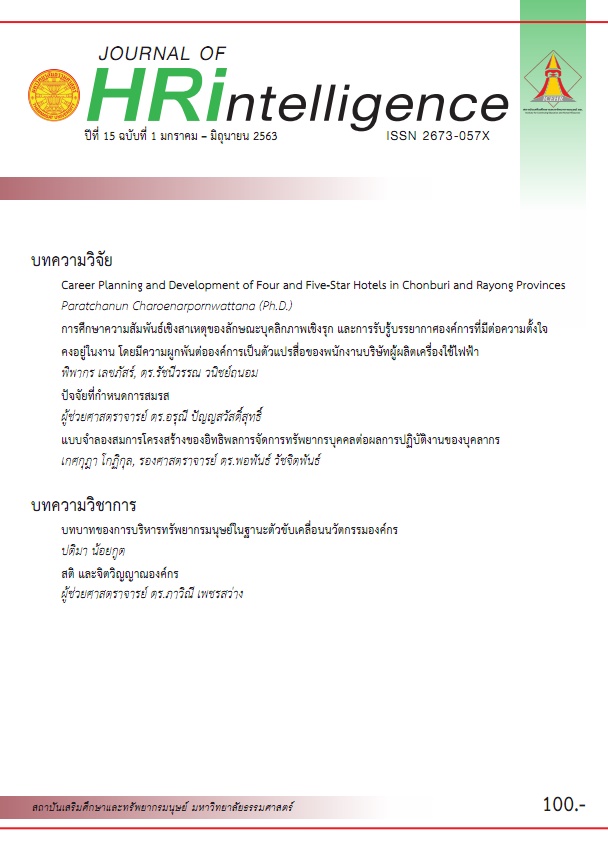Causal relationships of proactive personality and perceptions of organizational climate on intention to stay with organizational commitment as a mediator among employee of electric appliances company
Main Article Content
Abstract
Correlation research was used to study causal relationships of proactive personalities and perceptions of organizational climate upon employee intention to stay with organizational commitment as mediator at an electric appliances company. Samples were 444 company employees. Data was collected by questionnaire. Categories included personal factors, proactive personality, and perceptions of organizational climate. The latter comprised identity, organizational structure, rewards, emotional support, growth opportunities, and standards. Organizational commitment was measured by affective, continuance and normative commitments. Other questions addressed intention to stay. Data was analyzed by frequency, percentage, mean, standard deviation, correlation and path analysis.
Results were that samples had a high level of proactive personality, identity, organizational structure, emotional support, and affective commitment. They had moderate levels of growth opportunities, standards, continuance and normative commitments. There was a moderate level of intention to stay. A significant positive correlation existed between proactive personality and three dimensions of organizational commitment, with affective and normative commitment at a level of .01. A significant positive correlation existed between proactive personality and continuance commitment at a level of .05. All dimensions of perceptions of organizational climate positively correlated with organizational commitment and intention to stay at a level of .01. All dimensions of organizational commitment positively correlated with intention to stay at a level of .01. Agreeableness and perceptions of organizational climate were directly and indirectly affected by mediation of organizational commitment on intention to stay. Proactive personality directly affected perceptions of organizational climate.
These findings suggest that a mutual relationship exists among proactive personality, perceptions of organizational climate, organizational commitment and intention to stay. Perceptions of organizational climate was directly and indirectly affected by the mediation of organizational commitment upon intention to stay. Companies in Thailand might focus on these variables to develop organizational personnel and plan strategies to boost employee intention to stay.
Article Details
ขอมอบลิขสิทธิ์บทความที่ได้รับการตีพิมพ์ให้แก่สถาบันเสริมศึกษาและทรัพยากรมนุษย์ กรณีมีการฟ้องร้องเรื่องการละเมิดลิขสิทธิ์เกี่ยวกับภาพ กราฟ ข้อความส่วนใดส่วนหนึ่ง และ/หรือข้อคิดเห็นที่ปรากฎในบทความ ให้เป็นความรับผิดชอบของข้าพเจ้าและผู้เขียนร่วมแต่เพียงผู้เดียว
References
Covey, S. R. (1989). The 7 habits of highly effective people. London: Simon & Schuster.
Yamane, T. (1973). An introductory analysis (3rd. ed.). New York: Harper and Row.
Articles
Allen, N. J., & Meyer, J. P. (1990). The measurement and antecedents of affective, continuance and normative commitment to the organization. Journal of Occupational Psychology, 63, 1-18.
Bateman, T. S. & Crant, J. M. (1993) Proactive component of organizational behavior: a measure and correlates. Journal of Organizational Behavior, 14, 103-118.
Baugh, S. G., & Roberts, R. M. (1994). Professional and organizational commitment among engineering: Conflicting or complementing? IEEE Transactions on Engineering Management, 41(2), 108-114.
Blau, G. J., & Boal, K. B. (1987). Conceptualizing how job involvement and organizational commitment affects turnover and absenteeism. Academy of Management Review, 12(2), 288-300.
Cowin, L. S., & Hengstberger-Sims, C. (2004). New graduate nurse self-concept and retention: A longitudinal survey. International Journal of Nursing Studies, 43, 59-70.
Steers, R. M. (1977). Antecedents and outcomes of organizational commitments. Administrative Science Quarterly, 22, 46-56.


